The buzz about caffeine
Is caffeine bad or good for you? The answer is: a little of both.
By Emily Sohn
You’re drinking lots of cola at a party, when suddenly it hits: You! Are! Hyper! You jump around. You talk too fast. You laugh so hard that soda squirts out of your nose. Later, you can’t fall asleep, and the next day, you’re tired and feel awful. Sound familiar?
Most kids already have a ton of energy, but kids who drink a lot of cola often end up even more wired than usual. The soda’s high sugar content is partly to blame, but cola also usually includes an energy-sparking chemical called caffeine.
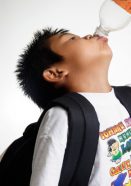 |
|
Drinking caffeinated soda can give kids a burst of hyperactive energy.
|
| iStockphoto.com |
Like cola, coffee is full of caffeine. That’s why many adults drink it first thing in the morning to help them wake up. The chemical is also naturally found in tea, chocolate, and hot cocoa. Because people crave the caffeine kick—and may even become addicted to it—food manufacturers add the chemical to many other sodas as well as to energy drinks and snacks.
Parents and teachers usually try to keep kids away from caffeine. But is this chemical actually bad for your health? The answer is complicated.
Good caffeine, bad caffeine
First the plus side. Some studies have shown that caffeine might help people respond to things more quickly and even run longer. Scientists have also recently found evidence that caffeinated coffee and tea can help protect the heart, brain, and other organs from disease.
On the other hand, too much caffeine can make people anxious and unable to sleep. A 2003 survey of more than 200 students in grades seven through nine found that kids who drank a 16-ounce bottle of cola slept less, woke up more often, and felt more tired the next day than kids who drank less caffeine. This is worrisome because sleeping well is an important part of staying healthy (See “Getting Enough Sleep”).
Caffeine can also raise your blood pressure, increase your heart rate, and make you feel more stressed, which may eventually lead to heart disease and other health problems.
“If you feel a lot of pressure at school, caffeine is going to make you feel even more anxious,” says Jim Lane, a psychologist at Duke University Medical Center in Durham, N.C.
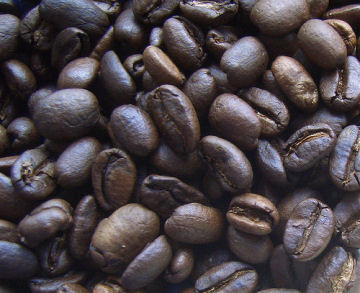 |
|
Roasted coffee beans, like these, are ground and brewed into steaming cups of coffee. The fragrant beverage is the main source of caffeine for most adults.
|
| Wikipedia |
Love it or hate it, caffeine is hard to avoid. Coffee shops crowd city streets and malls. Vending machines offer caffeinated sodas in schools. And even though caffeine-free versions of coffee, tea, and cola are widely available, more than 80 percent of adults consume caffeine regularly in North America, according to a 2004 study, mostly in the form of coffee. And kids today are drinking more and more soda, caffeinated or not.
Some 30 percent of 8-to-13-year-olds surveyed by researchers at the University of Minnesota said that they drink soft drinks every day, according to a study published last year. And more probably would if they could: 95 percent of kids in the survey said they “like” or “strongly like” the taste of soda.
You’re feeling sleepy . . . NOT!
Caffeine works by blocking the effects of a sleep-inducing substance produced by your body called adenosine. The substance accumulates inside you throughout the day.
As adenosine levels rise, you become calm and drowsy. Later, as you sleep, adenosine levels drop. When you wake up, the cycle starts again. By not allowing adenosine to build up, caffeine keeps you feeling fired up—as if you’re ready to face a tiger attack.
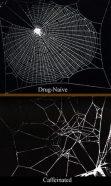 |
|
Human brains aren’t the only ones that feel the effects of caffeine. These images show how an extreme amount caffeine affects the brain of a tiny creature. In this case, the top picture shows how a spider spins its web before caffeine and after (bottom).
|
| NASA; Wikipedia |
Caffeine raises the amount of sugar in your bloodstream, even if there is no sugar in your caffeinated drink. That’s what gives you extra energy. The chemical also increases your blood pressure, which may make you feel as if your chest is pounding. But if you consume too much caffeine, you will probably feel nervous and sick.
Caffeine claims for brains
People say they like caffeine because it makes them feel alert. In experiments, people who are given caffeine say they feel more awake than do people who have been given a caffeinefree pill or beverage instead, says psychologist Peter Rogers of the University of Bristol in England.
 |
|
The caffeine in cola beverages like this one affects your brain and nervous system in ways that have nothing to do with sugar or other ingredients.
|
| National Cancer Institute/Wikipedia |
In other studies, caffeine appears to shorten reaction times: People press a button more quickly after seeing a symbol appear on a computer screen after they’ve had some caffeine.
On the basis of such findings, it’s tempting to conclude that caffeine helps people respond more quickly and pay better attention. However, says Rogers, there is another, more likely, conclusion.
Studies show that the people who do better on tests after taking caffeine tend to be regular caffeine users already. In other words, they are probably addicted to the chemical.
Taking caffeine away from habitual users causes them to have symptoms of withdrawal, such as headaches and sleepiness. It also slows their reaction times. So, when these people are given their daily dose of caffeine, they feel better and perform better on reaction-time tests than they do without it.
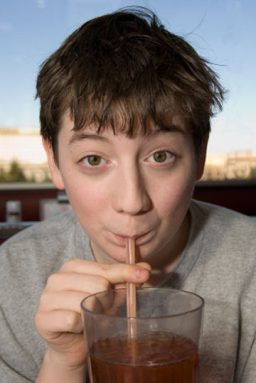 |
|
Coffee and other caffeinated beverages can be addictive, even for children.
|
| iStockphoto.com |
People who aren’t addicted, on the other hand, may feel jittery and more awake after taking caffeine, but the chemical doesn’t improve their performance on reaction-time tests. And regular caffeine users who get caffeine before the tests aren’t any more alert or quicker to react than people who don’t normally use the chemical and haven’t taken any.
Giving athletes a jolt
Caffeine has become popular with exercisers looking for an extra boost of energy. Research shows, however, that caffeine helps only athletes who are already in top condition and only when they are pushing themselves as hard as possible, says Terry Graham, a caffeine researcher at the University of Guelph in Canada.
In one study, Graham challenged nine runners to run on a treadmill at a very fast pace. On average, these athletes were able to run for about 32 minutes without caffeine. With caffeine in their systems, they ran 7 to 10 minutes longer.
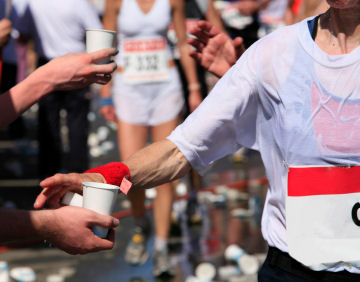 |
|
Athletes often take caffeine for an extra boost of energy. But the chemical doesn’t necessarily make them faster or stronger.
|
| iStockphoto.com |
Though caffeine may help the performance of world-class athletes, it may harm the health of people who are overweight. Graham’s other research has shown that caffeine interferes with the body’s ability to process sugars, which may lead to a disease called type 2 diabetes.
Kids, who tend to be smaller than adults, feel the various effects of caffeine more strongly than adults do. And just like adults, kids and teens can become addicted to the chemical.
A can of caffeinated soda every now and then is probably OK, nutritionists say, but sip carefully!
The following list shows how many milligrams (mg) of caffeine are contained in some popular products. All beverages refer to an 8-ounce (1-cup) serving, unless otherwise noted.
Regular brewed coffee: 135 mg
Red Bull (8.5 oz): 80 mg
Black tea: 40-70 mg
Java Water: 62 mg
Starbucks Coffee Ice cream (1 cup): 40-60 mg
Espresso (1 oz): 30-50 mg
Green tea: 25-40 mg
Mountain Dew and Diet Mountain Dew: 37 mg
Diet Coke: 34 mg
Hershey’s Special Dark Chocolate Bar (1 bar – 1.5 oz): 31 mg
Pepsi: 28 mg
Diet Pepsi: 27 mg
Coca-Cola Classic: 26 mg
Snapple Iced Tea: 24 mg
Jolt gum (1 piece): 20 mg
Hershey’s Milk Chocolate Bar (1 bar – 1.5 oz): 10 mg
Hot cocoa: 5 mg
Chocolate milk: 5 mg
Decaffeinated coffee: 5 mg
Decaffeinated black tea: 4 mg
Going Deeper:







